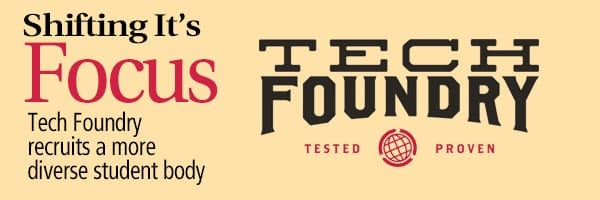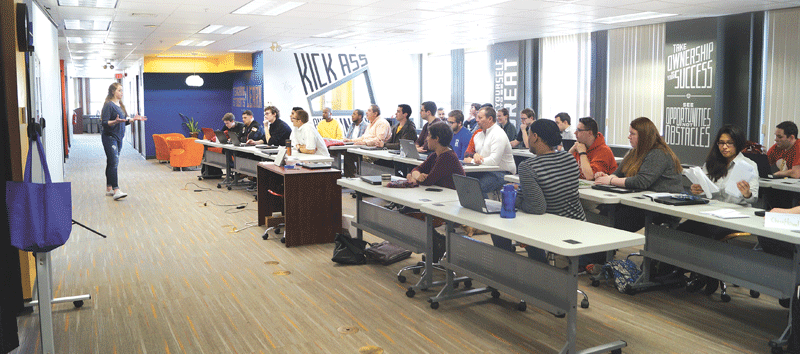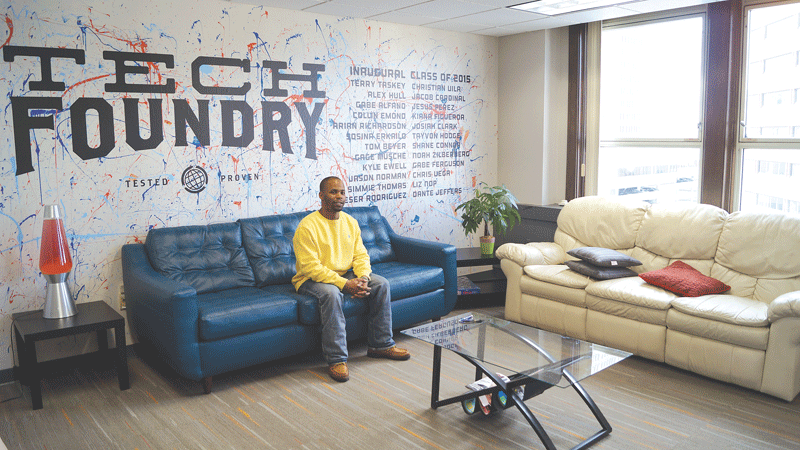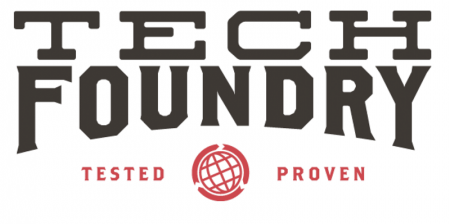
Tech Foundry Recruits a More Diverse Student Body
Shifting IT’s Focus
By Joanna Smiley

Keyla Centeno, team lead and graphic designer at Tech Foundry, teaches a class on soft skills.
When it was founded in 2013, Tech Foundry, a program conceived to create a steady pipeline of workers for the IT sector, focused primarily on area high-school students. But research — and experience — revealed that these young people were choosing other destinations (especially area colleges) rather than area technology firms. So today, the classrooms feature a much more diverse group of students.
Bruce Stoller is a 58-year-old displaced worker with aspirations to forge a new career in information technology. He holds a law degree, and has a background in facilities management.
Maura Kavanh, 29, used to study political science and women’s gender studies at UMass Amherst, but took a leave from college when she noticed an interesting trend: organizations she aspired to work at, like Planned Parenthood, had a far greater need for those with tech skills than policy work.
What do Stoller and Kavanh have in common?
Both are students in Tech Foundry’s class of 2017, a group far more diverse than those that came before it. And that’s by design and out of necessity.
Indeed, the Springfield-based workforce development program was launched in 2013 and designed to prepare job seekers — and not necessarily individuals like Stoller and Kavanh — for entry-level tech careers. But a year ago, the organization decided to shift its focus from a program designed for high-school students to one that has no age restriction. Tech Foundry’s current class is an eclectic mix of students ranging in age from 20 to 60.
Jonathan Edwards, director of Strategic Partnerships at Tech Foundry, notes that the organization’s shift was about responding to employers’ needs for a bigger pipeline of IT workers.
“We know that people in mid-career transition are the perfect candidates to expand that pipeline,” he explained. “They’re looking for something different; people who wake up and say ‘I want to do IT’ isn’t enough. Introducing people who already possess strong work backgrounds to a sustainable IT career is really a great match between the needs of employers and needs of our student population.”

Brandon McGee hopes to land a job in software sales once he completes the Tech Foundry program in May.
Ann Burke, vice president of the Economic Development Council of Western Mass., agreed.
“The good-news, bad-news experience from the first class was that these young people became excited about fields in technology, but instead of going directly into the workforce, many decided to continue their education in community college or college,” she explained. “This was great for the students, but not for tackling the issue of developing a pipeline for entry-level technology employees.
“Tech Foundry has been piloting different approaches to finding those individuals interested in tech job opportunities,” she went on. “The student body has evolved to include a much more diverse group, including veterans, people with some community-college experience, women, and others with some work experience but not necessarily in the tech field.”
Tech Foundry still welcomes 18-year-olds who would like to go into a job in the tech field, she went on, adding that the program’s leaders found that many employers are looking for candidates with at least some work experience and soft skills, even if they do not have past technology experience.
“Tech Foundry is an innovative program that will continue to evolve to meet the needs of this growing sector,” said Burke. “It actually is interesting and exciting to see the diversity of age, gender, experience, and ethnicity in the most recent graduating class. I’m excited about how the organization is continuing to scale and prepare more candidates to be a part of the technology workforce. We know that there is a need for qualified, entry-level technology workers across industry sectors in the region.”
For this issue and its focus on employment, BusinessWest takes an in-depth look at this change in focus for Tech Foundry and its implications for the workforce, job seekers, and area companies.
Technically Speaking
Tech Foundry prides itself on partnering with a broad range of companies in the region, and Edwards said he has noticed a cross-section of employer size and industry. Partners range from Bay State Health to Smith & Wesson to startups that seek the type of talent Tech Foundry is producing.
Its success in meeting its important mission is made clear by several testimonials from area business owners and one elected official.
Andrew Anderlonis, president of Rediker Software, has been partnering with Tech Foundry for more than a year, and says the organization has helped him solve a major problem — finding passionate, talented, and committed professionals who can meet the continuously evolving workforce needs of the region’s tech community.
“Rediker Software has now hired four graduates from Tech Foundry, and all of them are performing exceptionally well, a testament to the strength of the program,” he noted. “Working with Tech Foundry has been a wonderful experience as they have put together a terrific program for the students.”
Michael Arian, co-founder and CEO of Prophit Insight, says Tech Foundry not only provides him with talented IT employees, but the opportunity to give back to the Springfield community.
“We’ve been working with Tech Foundry since their beginning. It has been a very important program for us,” he told BusinessWest. “Tech Foundry has allowed us to acquire talented IT employees in a more cost-effective manner, and it has been very successful so far.
“It also provides us the opportunity to give back to the Springfield community and help out some fantastic people who just need an opportunity, this is very important to us,” he went on. “We’ve hired three employees from Tech Foundry and currently have another who is interning, and we hope to bring him on full-time shortly.”
State Sen. Eric Lesser agreed, and said Tech Foundry’s model is one he is working to replicate statewide.
“In just three short years, Tech Foundry has shown itself to be very nimble and responsive to our region’s employment needs. Western Mass right now faces a substantial ‘skills gap’ between the available jobs in growing fields like technology and advanced manufacturing, and workers looking for employment. There is a particular challenge facing older workers who are already out of school, who either need to update their training or learn new skills to stay competitive as our region’s economy continues to shift toward fields dependent on technology and innovation. I’m glad Tech Foundry is taking this on. Their model has already proven very successful at getting workers the specific training they need quickly and efficiently for younger students, so expanding to older members of the workforce is welcome and desperately needed.”
Edwards said Tech Foundry’s goal is to eventually have twice the number of employers seeking candidates as there are students in the program. Currently, the agency partners with 60 companies in the area. Starting salaries for graduates of the program can range from $30,000 to $50,000 per year.

On a recent afternoon at Tech Foundry’s space in downtown Springfield, Keyla Centeno was teaching a roomful of students gathered around ping-pong tables how to hone their professional communication and interpersonal skills. They were taking part in a team-building exercise that required careful listening and negotiation.
“This is one of our most diverse cohorts,” she noted. “It’s a pleasure to see them help each other and come out of their shells. This older demographic we have tells me a lot of people want to change their careers and break off from what they’re doing right now; some employers even require tech training now.”
Stoller, 58, is the oldest student in this cohort. The Springfield native lived in Boston for 20 years and recently moved back to Western Mass. He practiced criminal law before retiring from his legal career to work in facilities management.
Stoller was let go during his company’s “reorg,” and because his position was eliminated, he qualified to be what’s called a displaced worker, meaning any training or schooling he attends is paid for in full for up to one year. His end goal? To land a new job at a help desk, not necessarily doing programming, but using his sales skills.
Brandon McGee, 29, was born and raised in Springfield. He found his calling in technology at the age of 13, when he would sit in his bedroom at 3 a.m. tinkering on his Dell computer. Currently enrolled at Springfield Technical Community College, he said he “took advantage of anything his professors gave me a heads-up on,” and that included a recent suggestion to look into Tech Foundry.
After working in the telecommunications industry for a number of years, McGee knew he needed an additional skill set to advance to his dream career — software sales.
“I knew I wasn’t coming from a top school, I didn’t have the greatest GPA, and I wanted to immerse myself in a way where I could be competitive and acquire transferrable skills; I want to work for a company where staying relevant is a priority,” he explained. “I started out thinking printers and passwords were IT — now I know there’s so many more avenues in the field.”
Bottom Line
McGee says he’s a “little nervous to leave the coop” in May when he graduates from Tech Foundry.
“The people at Tech Foundry have been immensely supportive — it’s a free program with huge opportunity,” he noted. “We’re all in different aspects of our life, and every opportunity here is one to get your name out there and go for it.”
Today, there is a more diverse group of people ‘going for it’ thanks to Tech Foundry, a development that bodes very well for the region, its workforce, and companies struggling to find needed IT workers.





